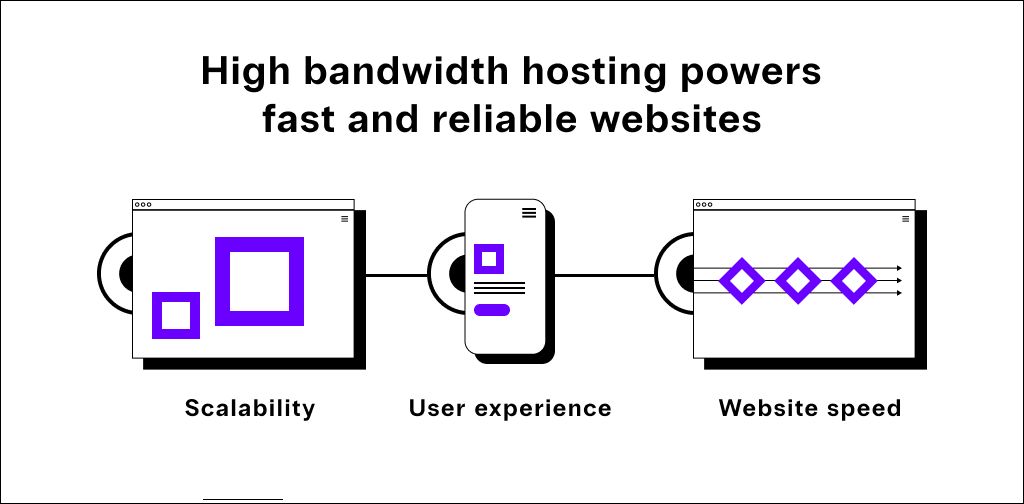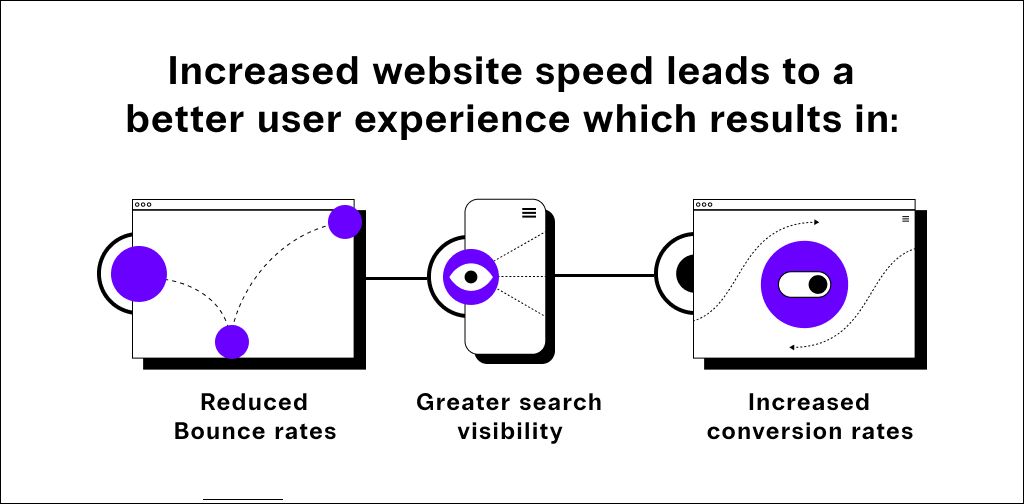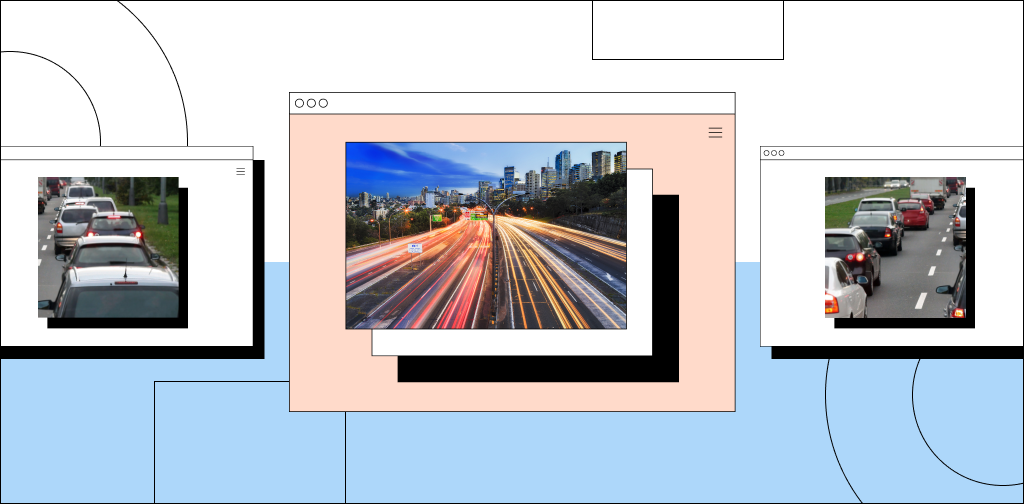It’s crucial that your website provides a positive user experience. As a medium for customers to interact with your brand and what you offer, your website shouldn’t cause frustration unless you want to lose your audience.
You may already understand why your website’s bandwidth, page speed, and load speed play a large role in user experience, but how can you significantly improve each of these factors?
Keep reading to learn how users are affected by bandwidth, how to evaluate your website’s performance, and how to decide whether you need high bandwidth hosting.
In full, here’s what we’ll cover:
- What is bandwidth in web hosting?
- Why high bandwidth web hosting is important
- Server bandwidth versus website bandwidth
- How much bandwidth do you need?
- Why page and load speed are essential
- Final thoughts: What is high bandwidth hosting and why is it important?
What is bandwidth in web hosting?
Bandwidth measures how quickly amounts of your website’s data can be sent to the user. To illustrate, consider a website with a bandwidth of eight megabits per second. Imagine it takes 24 megabits to load the homepage after a user clicks. With the current bandwidth, it’d take three seconds to load.
If a website has limited bandwidth, the result is slower load speed and a website that can’t handle many visitors. This can easily result in a bad experience for users. High bandwidth web hosting solves this problem by sending more bits per second.
Depending on which kind of hosting provider you chose, you may incur extra charges for going over your plan’s bandwidth limit, which can happen if you get more visitors than expected.
Get high bandwidth hosting from Nexcess
Simplify performance & IT management with our server clusters
Why high bandwidth web hosting is important
Your website’s speed is directly related to bandwidth. The higher your bandwidth, the more data can be transferred between your website and the user. Therefore, you want your bandwidth to be as high as possible, so your visitors aren’t waiting as long.
High bandwidth hosting affects three primary areas of your website: traffic scalability, user experience, and overall website speed.
With a regular hosting speed plan, your provider limits your bandwidth and speed, consequently limiting your user experience and search rankings.
But when you use high bandwidth web hosting or unlimited bandwidth plans, like with Nexcess, you can maximize scalability and ensure a speedy website. Using an unmetered bandwidth server in a top-tier data center will maximize your website’s uptime — and it provides customer support.

Scalability
Your bandwidth is like a highway. Imagine the number of cars on the highway increasing every Monday morning. At a certain point, a huge traffic jam will occur.
Using a standard bandwidth hosting plan is like a four-lane highway during rush hour — your website will slow down and may even crash.
In contrast, high bandwidth hosting lets you scale your website without fear of traffic jams or security concerns.
Let’s say you’re running a sale or a promotional campaign. Your website is likely to experience an increase in traffic. Users can’t become customers if they can’t access your website. But with high bandwidth server hosting, you’ll reduce bounce rates, which increases conversion rates.
User experience
Think of your website as an extension of your customer service experience. An easy way to lose out on customers is to make them wait. Slow load times and poor website performance can lead to frustrated visitors and lost opportunities.
While customer experience and user experience aren’t the same, your customer experience is still highly influential to how your brand is perceived. According to Statista, 82 percent of customers will recommend a company based on customer service alone.
Website speed
Server response time plus load speed equals your website speed.
Load speed is how long your website takes to load in your visitor’s browser. Server response time is how long the host server takes to process a user’s request and deliver a response.
We’ll discuss how to improve them — but first, you need to know how server bandwidth plays into high bandwidth hosting.
Server bandwidth versus website bandwidth
Server bandwidth is the amount of data that can be transferred from the hosting server to the internet. In contrast, your website bandwidth is the total data that can be transferred from your user to your website.
It’s important to make this distinction because server bandwidth is the responsibility of your web hosting provider. Without sufficient server bandwidth, your website could crash or become unresponsive during traffic spikes.
You won’t have to worry about this if you choose high bandwidth server hosting from a reliable provider. If you have doubts about your host's server bandwidth, you can either upgrade your current hosting plan to a higher tier or switch your web hosting solution.
How much bandwidth do you need?
Before you calculate how much bandwidth is optimal and whether you need high bandwidth hosting, you should check with your website host to see if you have unlimited bandwidth or a limit.
That being said, if you need to estimate website bandwidth, follow these steps:
- Calculate your website’s average page size: Include all components like scripts, videos, and images.
- Estimate your monthly traffic: Use a tool like Google Analytics to understand how much traffic your website receives on average.
- Multiply your average page size by your monthly average traffic: This will get you a value in bytes of total bandwidth per month. However, bandwidth is measured in bits. To convert bytes (a unit of storage) to bits (a speed of transfer), multiply bytes by eight. Here’s a calculator.
- Add buffer for margins of error: Take your total from step three and add 20–30 percent of it on top as a margin of error buffer, which will help with traffic fluctuations from promotions or algorithm updates.

Let’s take a look at an example of this calculation.
If your average page size is one megabyte and your average monthly traffic is 10,000 visitors, your monthly data usage would be 10,000 megabytes, which is 10 gigabytes.
To convert that into bits, multiply by eight, which lands you at 80 gigabits — the minimum amount of bandwidth you’d need per month. Now you add an extra 30 percent for safety, which brings you to 104 gigabits.
Keep in mind that this calculation is an estimate. Depending on where your website is hosted and where your users are accessing it from, you may need more bandwidth or require less. Periodically check on the usage over time.
How to check your bandwidth
It’s simple to determine how much bandwidth you use, regardless of your current web hosting provider or whether you have high bandwidth hosting. Most web hosting providers offer tools or dashboards to monitor bandwidth usage in real time.
To check your bandwidth usage, try logging into your web hosting account and navigating to your dashboard or control panel. Look for bandwidth usage. You might find a tab or section called “data transfer,” “bandwidth consumption,” or something similar. The unit of measurement will give it away — either bits per second (bps) or megabits per second (Mbps).
If you’re curious about your traffic spikes, use the charts to analyze a time period when you ran a promotional campaign and how much bandwidth you used. If you pair this knowledge with the bandwidth estimate calculation above, you can rest assured that your website will provide the best user experience possible under large traffic.
Page speed versus website speed
Page speed is the time each individual page takes to load when someone clicks on it. Since your website is a collection of individual pages, it makes sense that website speed is an average of the load times for every page.
You can influence both metrics with the types of images you use, the content on your website, and your website bandwidth.
In turn, website speed influences key metrics such as search visibility, conversion rates, and bounce rates.

In general, a higher website speed is the result of higher bandwidth. If you compared an eight-lane highway to a four-lane highway, the average car speed would be higher on the eight-lane road. And during rush hour, the difference would be more profound.
Your website bandwidth is a limiting factor for your page speed and website speed. With high bandwidth hosting, your website could run much faster.
However, you might already use an unlimited bandwidth plan and want to improve your overall website speed.
That’s because no matter how high spec of a hosting plan you use, unoptimized sites will still be slow. It’s important to note that you should be offloading site bandwidth to a CDN provider for site assets. Slow front end requests will cause your site to be slow, regardless of how much bandwidth you can use.
Other factors influencing your website speed include:
- Size of images and other media on the page.
- Complexity of the page’s content, such as the number of front end assets — the fewer assets that load the faster the front end load time is for the site.
- Performance of the user’s CPU and internet connection.
- Number of server requests needed to load each page.
- Dedicated server bandwidth and hosting performance.
While your user’s internet connection is out of your control, you can manage the other factors for optimal performance. Focus on these high-leverage points to have the greatest impact, whether or not you have high bandwidth hosting.
How to increase overall website speed
Getting a baseline measurement is always a great idea. To determine your website speed, use a tool like Google PageSpeed Insights. Here you can run tests on your homepage and other parts of your website that receive the most traffic.
It’s also important to test your website multiple times and average the results. That way, you get a holistic view of your website.
Let’s cover some methods to improve speed.

Optimize your media
Images and videos typically occupy the most space on your website. If you don’t upgrade your bandwidth, more bytes of data means a slower website. And with more traffic, it gets exponentially worse.
You could try external linking if a large video is embedded but not essential to the page. You could also lazy load embedded or externally hosted video assets on the site. For images, you can resize to reduce the quality of each image.
If it’s your WordPress website being slow, you can resize images down to pixel sizes that are more likely to be needed and also to optimize images. Resizing and optimizing are the best options, but you should also check on the loss of image quality when images have been optimized.
The best option would be to optimize at the edge with something like Cloudflare Polish. Cloudflare Polish also serves next-generation image formats such as WebP and AVIF to end users on devices that support those formats.
Minimize HTTP requests
Each time a browser loads a webpage, it sends a signal (an HTTP request) to load each file. When you minimize these requests, you have a faster load speed. Reduce HTTP requests by combining multiple CSS and JavaScript files into one file.
Enable browser caching
When a user visits your website, their browser stores some files locally. If the user leaves the website but later returns, their device will still have some files from the last time and, therefore, won’t ask the server to download them.
This minimizes the total amount of bandwidth and HTTP requests from returning visitors, which increases page speed and website speed. Depending on your hosting company, this may be automatically turned on. You may need to talk with your host to determine if you have browser caching enabled.
Here at Nexcess, your browser caching is not automatically turned on in our managed WordPress hosting plans. It needs to be added to the site’s .htaccess file.
Regularly update and remove outdated plugins
If you find plugins that aren’t essential to your website, removing them is a great idea. Added plugins are basically excess code, which results in more HTTP requests, ultimately slowing down your website.
On the other hand, regularly updating useful plugins will speed up your website. Plugin developers consistently test and optimize their code, so new versions work as efficiently as possible.
Final thoughts: What is high bandwidth server hosting and why is it important?
In today’s digital world, website performance and speed are more important than ever. Since long load times lead to a negative user experience, higher bounce rates, and lower search visibility, it’s become hard to overlook high bandwidth hosting.
Don’t let poor website performance hold your business back.
Investing in a reliable, high bandwidth hosting service ensures your website provides a fast, responsive, and reliable user experience. Plus, enjoy features like solid-state drive (SSD) data centers, automatic backups, and virtual private servers (VPS).
Nexcess offers enterprise web hosting plans for ecommerce brands with lightning-fast, reliable bandwidth. Get started today with Nexcess and experience high bandwidth hosting.

